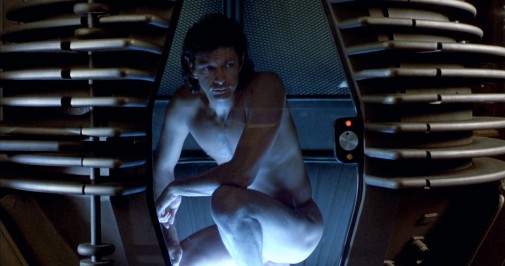
Last week, you were asked to choose a horror movie performance to be analyzed in the Almost There series. From the ten possibilities, the pick was Jeff Goldblum in David Cronenberg's The Fly. Telling the story of a scientist who accidentally gene-splices himself with a housefly, the movie is the platonic ideal of body horror and probably the title most readily associated with the subgenre. Chris Walas and Stephan Dupuis' makeup is justly legendary and won the pair an Oscar. One would think horror would be a mainstay in that particular category, but AMPAS rarely embraces it, even there. Hence why The Fly's awards success feels so thrilling. Unfortunately, it's also why Goldblum's transformative work was ignored...
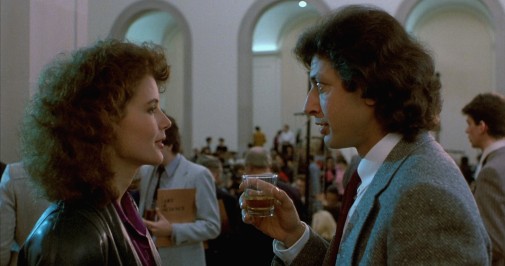
Beyond its genre-bending and entomological fascinations, The Fly represents the peak of Cronenberg's experimentation with tone. While it's easy to characterize the movie as a work of body horror, as I already did, there's more to it. The director dabs in sci-fi possibilities, romantic comedy shenanigans, and solemn tragedy. If, in the beginning, modes of storytelling are separated, by the end, every tone fuses in an uncategorizable piece. To ask an actor to consider all this while also materializing Dr. Seth Brundle's transformation into the Brundle-fly is one hell of a demand. Fundamentally, the movie would be ruined with the wrong leading man, incapable of being funny and desperately romantic, while becoming a dehumanized man, a crime against nature. Thankfully, for Cronenberg and all of us, Jeff Goldblum proved to be a perfect choice.
That's evident in the movie's first sequence, a marvel of economic storytelling that establishes both Seth and his paramour, journalist Veronica 'Ronnie' Quaife. We see them talking at a party, flirting, visiting the inventor's lab, and witness a demonstration of his teleporting technology in little more than five minutes. Performance-wise, it's a matter of delivering strong first impressions that set the stage for subsequent subversions of these people's status quo. For Goldblum specifically, it's mostly an exercise in awkward comedy. For example, the actor's characteristic vocal cadences are in full bloom, so quirky they threaten to topple early scenes entirely into love-crazy fizziness. He sounds utterly disarming, in other words.
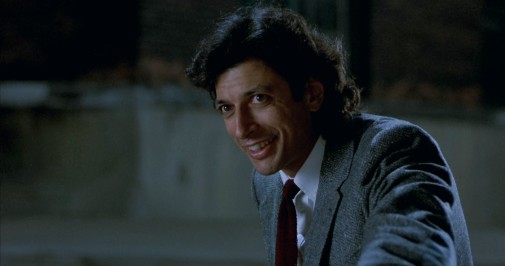
Not that his confidence is uncomplicated or without nuance. It often feels performative, but the intensity with which the character and actor articulate the idea makes it magnetic. The attitude becomes charming when tempered by just the right amount of eccentricity - a too-wide grin, over-demonstrative gestures, and smiling eyes. The dynamic could easily turn creepy, but The Fly's protagonists strike an uneasy balance. Basically, Goldblum and Geena Davis have chemistry for days, their mere presence elevating the scripted relationship into something more emotionally complex than what could have been. Nevertheless, these first moments together are about miscommunication, maybe some manipulation. He thinks they're flirting. She sees it as an interview.
You find plenty of earnestness in how Seth's countenance changes once he realizes Veronica's interest was strictly professional. Seeing her recorder, the smile of a kid with a crush turns into a grimace dripping with anxiety. It's not the most fortuitous first encounter, but the two can't stay apart for long. As things turn romantic, it's not even that difficult to understand the journalists' attraction for the hapless nerd. Jeff Goldblum's hot, but it's furthermore hard to resist his take on Seth's enthusiasm. Goldblum plays a loveable dork, naturally morphing bravado into giddiness, a glimmer of insecurity shining in the corner of his eye. He's testy, too, in case one thinks he's some ideal. These are the foundations for the incoming loss of humanity, both at the level of body and personality.
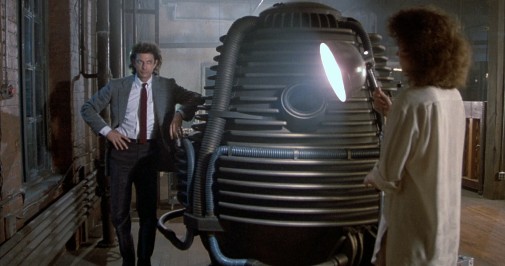
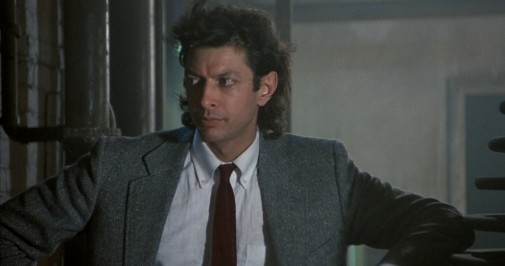
One can see that before the mutation occurs. Interviewed on-camera after another bloody failure, it's remarkable how Goldblum calibrates the performance depending on shot scale. The wide shot finds him exploring a teenager's gangly posture, something that could be humorous if not for the actor's mutinous expression. As the camera approaches, the displeased frown twists into something uglier, viciousness born out of disappointment. From cute man-child to mad scientist, all captured in the transition from wide to medium shot. Examining acting through such technical paradigms may seem needlessly nerdy, but there's value in understanding how characterization can be modulated according to the camera's gaze. In some way, it's one of the principal tenets that make screen acting so different from stage performances. Put a pin on that.
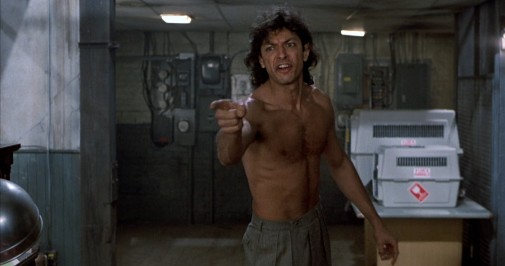
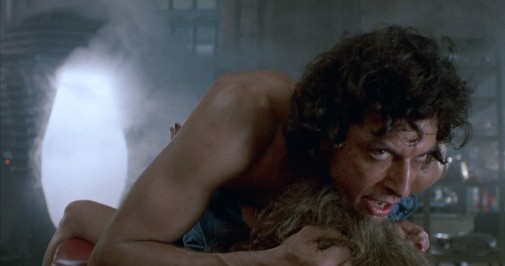
No sooner does scientific success appear on the horizon, disaster strikes. As it happens, petty jealousy doesn't mix well with sexual insecurities. Add booze, and you have the kind of cocktail no scientist should abuse. Drunk on that concoction, Seth tries to teleport himself one lonely night, not realizing an errant fly got caught in the pod with him. As he exits the clouds of white smoke, sweaty and golden, enshrined in glorious self-regard, Seth is unaware of the price he'll have to pay for such hubris. The invertebrate's influence first manifests in increased strength and beast-like energy. In no time, Seth starts to sound like an overexcited maniac, devouring sugar by the boatloads while talking like a 1930s screwball dame on a coke binge. It's terrifying, and that's before human physiognomy starts to deteriorate into insectoid slush.
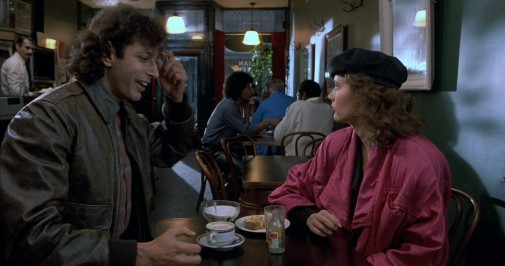
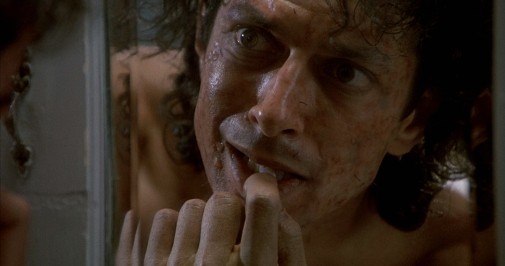
Next, strange hairs and irritable skin appear, increasing the adolescent quality of Goldblum's characterization. He looks like an acne-riddled youngster with immature bluster to match. In a way, the scientist is going through a second puberty. Only it's not adulthood his body's growing into. His fury festers, his horniness blazes, his senses overwhelm. Please pay attention to his wandering eyes, tense shoulders, and the tinge of constant alertness that gives off the idea that Seth's starting to lose control of his sensorial intake. Then, after super-strength drives him to a plasmodial mess of violent machismo, his body crumbles under the weight of molecular fusion. Staring at his reflection as teeth fall and open sores expel unnatural oozes, Seth's bravado dies a quick death. It's replaced by utter horror – his and the viewer's.
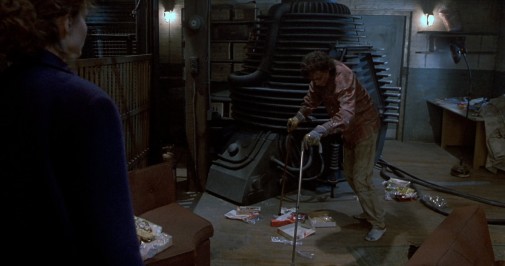
Walking with a cane as if his joints were brittle and stuck, the inventor begs for pity from his erstwhile lover. As a viewer, it's difficult to discern what's more revolting - his gross visage or the pain it emanates. Moreover, it brings about a visceral confrontation with our own mortality. Transcending the narrative actuality of his experiment, the scientist recalls an exaggeration of old age. The process of a body decaying while still alive is put on overdrive within the limits of Goldblum's physicality, and it takes a toll on his spirit. Cut to a scene later when that dolorous state has oscillated into another extreme. Suddenly, he's happy with the horror, climbing up walls like Spider-man and demonstrating his digestive process with all the enthusiasm of a children's TV host. Somehow, acceptance is scarier than depression. Don't worry, though - that euphoria won't last. Nothing does.
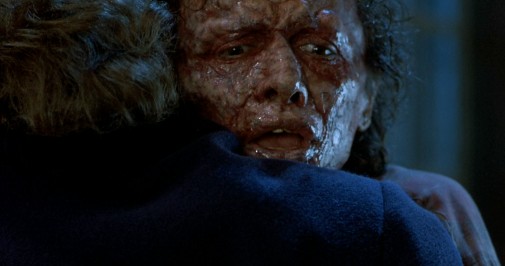
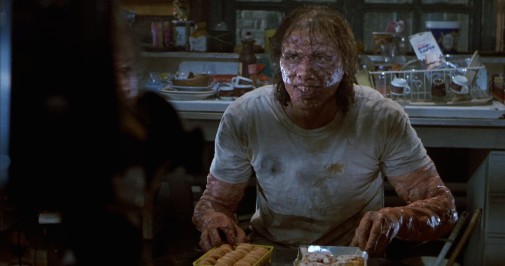
Near the end, the monologue by which Seth describes himself as an insect that once dreamed he was a man is perhaps Goldblum's most impressive scene. At that point, the makeup effects have fully taken over, and the protagonist's expressivity becomes difficult to discern. And yet, he works with it, delivering it with the tired franticness of a mind trying to run ahead of its inevitable ruination. There's such sorrow in his eyes, even as the head twitches, a convulsing tumor with a toothless gash where a mouth once was. Here, Goldblum and Cronenberg have staged the death of humanity, emotion gasping its death rattle before animal instinct takes over. All that being said, to merely declare that Goldblum acts through the layers of makeup is erroneous. The actor's performance isn't in conflict with cosmetic wizardry. Instead, they're a symbiote and wouldn't work independently from each other. Thus, it feels like an extreme visualization of cinema's collaborative nature and film acting specifically.
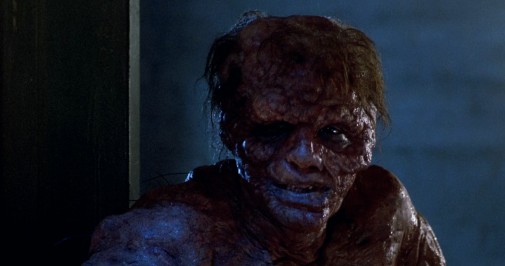
During the 1986-7 awards season, Goldblum's hideous miracle of a performance won excellent reviews. Even some of the critics, reluctant to accept Cronenberg's vision, praised the actor's efforts. As a result, the National Society of Film Critics nominated him, as did the New York Film Critics Circle. In the end, though, AMPAS looked the other way. Their selected five were Dexter Gordon in Round Midnight, Bob Hoskins in Mona Lisa, William Hurt in Children of a Lesser God, Paul Newman in The Color of Money, and James Woods in Salvador. It was the year when Newman finally took home a competitive Oscar after seven unsuccessful nominations and an Honorary Award. Because of that and the general quality of the other nominees, it's difficult to begrudge the voters too much for Goldblum's absence. Even so, his work towers over this particular quintet and would have made a great winner too.
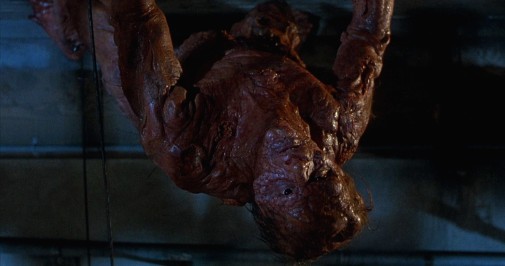
The Fly is currently streaming on fuboTV, AMC+, Epix, DirecTV, Sling, and Spectrum On Demand. You can also rent it on several other platforms.